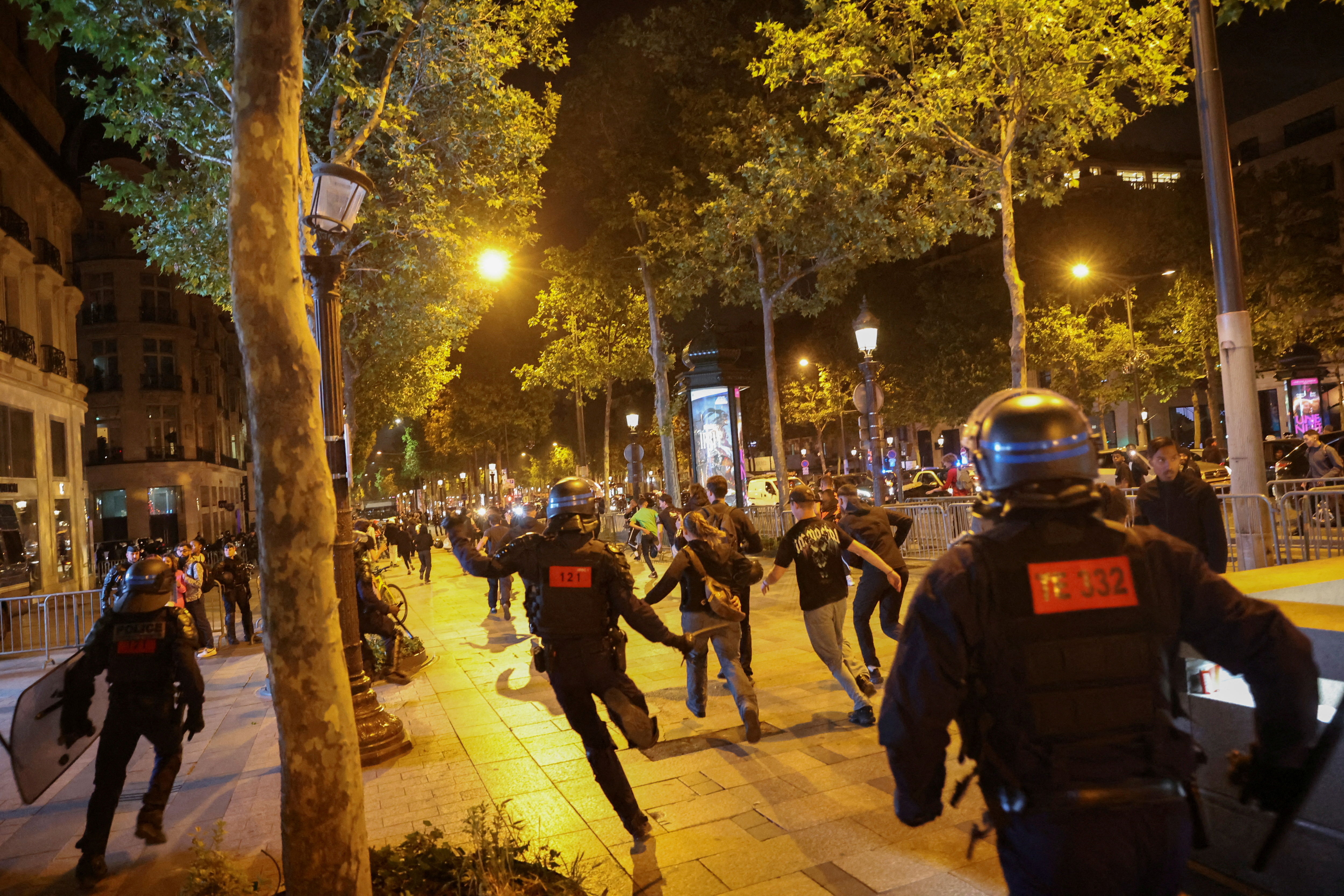
Young rioters clashed with police overnight and targeted a mayor’s home with a burning car as France faced a fifth night of unrest sparked by the police killing of a teenager of North African descent, but overall violence appeared to lessen compared with previous nights.
Tens of thousands of police were deployed in cities across the country on Saturday after the funeral of Nahel M. in the Paris suburb of Nanterre. Police made more than 700 arrests nationwide in an attempt to quell France’s worst social upheaval in years.
Interior Minister Gerald Darmanin said early on Sunday that it had been “a calmer night thanks to the resolute action of the security forces.”
However, Mayor Vincent Jeanbrun wrote on Twitter that protesters “rammed a car” into his home, before “setting a fire”. “My wife and one of my children were injured,” he said.
Speaking to reporters, Prosecutor Stephane Hardouin said the incident had been “qualified as attempted murder.” “All measures will be taken to identify the perpetrators and have them face justice,” he added.
French Prime Minister Elisabeth Borne condemned the attack. “An act of the kind we saw this morning here is particularly shocking. We will let no violence get by” unpunished, she said, urging that the perpetrators be sanctioned with the “utmost severity”.
President Emmanuel Macron postponed a state visit to Germany that was due to begin on Sunday to handle the worst crisis for his leadership since the “yellow vest” protests paralysed much of France in late 2018.
He was due to meet his ministers on Sunday evening to review the situation, after activating the government’s “crisis unit” until further notice.
Some 45,000 police were on the streets with specialised elite units, armoured vehicles and helicopters brought in to reinforce its three largest cities, Paris, Lyon and Marseille.
As of 1:45am (23:45 GMT, Saturday), although the situation was calmer than the previous four nights, there was still some tension in central Paris and sporadic clashes took place in the Mediterranean cities of Marseille, Nice and the eastern city of Strasbourg.
The biggest flashpoint was in Marseille where police fired tear gas and fought street battles with youths around the city centre late into the night.
In Paris, police increased security at the city’s landmark Champs-Elysees Avenue after a call on social media to gather there. The street, usually packed with tourists, was lined with security forces carrying out spot checks. Shop facades were boarded up to prevent potential damage and pillaging.
Police said 719 people were arrested nationwide on the fifth night of rioting. The interior ministry said 1,311 people had been arrested on Friday night, compared with 875 the previous night, although it described the violence as “lower in intensity”.
Local authorities all over the country announced bans on demonstrations, ordered public transport to stop running in the evening and some imposed overnight curfews.
Rioters have torched 2,000 vehicles since the start of the unrest. More than 200 police officers have been injured, Darmanin said on Saturday, adding that the average age of those arrested was 17.
More than 700 shops, supermarkets, restaurants and bank branches had been “ransacked, looted and sometimes even burned to the ground since Tuesday”, Finance Minister Bruno Le Maire said.
Inspired by the riots in France, unrest spread to the Swiss city of Lausanne, Swiss police said Sunday, after more than a hundred youths damaged shops in the city centre.
Funeral held
Nahel, a 17-year-old son of Algerian and Moroccan parents, was shot by a police officer during a traffic stop on Tuesday in the Paris suburb of Nanterre.
For the funeral, several hundred people lined up to enter Nanterre’s grand mosque. Volunteers in yellow vests stood guard while a few dozen bystanders watched from across the street.
The shooting of the teenager, caught on video, has reignited longstanding complaints by poor and racially mixed urban communities of police violence and racism.
Nahel was known to police for previously failing to comply with traffic stop orders and was illegally driving a rental car, the Nanterre prosecutor said on Thursday.
Macron has denied there is systemic racism in French law enforcement agencies.
Fifteen-year-old Dgibril, a French citizen, told Al Jazeera in Paris that he was searched twice on Saturday, apparently because of his skin colour.
“I was walking around the Champs-Elysee with friends. As soon as we got here, we got stopped and searched. We stayed, and five minutes later, I got searched again, and it just never stops,” he said.
“They are choosing who to search by the colour of their skin. It’s always the same people being stopped.”
Salah, a tourist from Algeria, said his group was searched multiple times too.
“We are tourists, just walking around. We don’t know why they picked us, maybe because we look Arabs,” Salah said. “They only stop Arabs and Blacks, white people – they let them go.”







